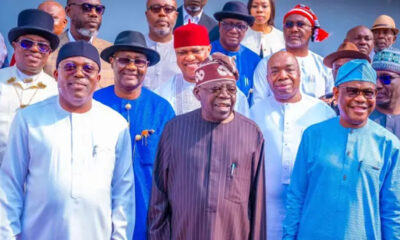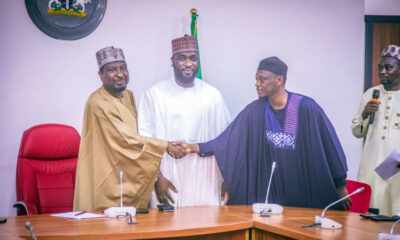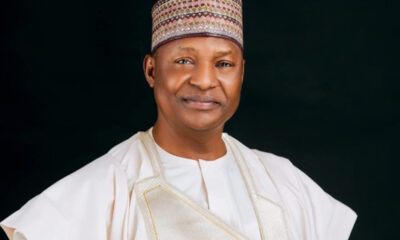Business
Compliance to standards will make Nigerian products globally competitive – SON

The Standards Organisation of Nigeria (SON) has said locally produced goods must adhere strictly to standards to be competitive globally.
The Director General of SON, Malam Farouk Salim, stated this at the flagging off of a campaign tagged “Standardisation; Panacea for economic growth” in Enugu. (When?).
The SON boss said that adhering strictly to standardisation and quality assurance would make Nigerian products and services more acceptable at the international market.
Salim, represented by the SON Director South-East Operations, Mr Fred Akingbesote, said when all products and services conformed to standards, the country and her people would benefit tremendously from it.
He explained that there was standard for every product or service, adding that upholding standardisation even in service industry of hospitality, tourism and hotel would create international markets and patronage for such services.
The SON boss said standardisation would also lead to cost reduction, less effort on production, strengthen brands and make it convenient and easy for customers to recognise and pick quality products and services.
“If you see any product with SONCAP certification logo, rest assured that you have got a product with quality and satisfaction guaranteed.
“It provides a company with a competitive edge in the market. “Manufacturers and service providers need to ensure that their products and services meet the right specifications and deliver on their customers’ expectations.
“When a company assesses its products and services in accordance with relevant standards, this helps the company to adapt to the latest market trends regarding quality.
“And avoid the costs related to product returns, buyer complaints, and loss of goodwill in local, regional, and international markets,” the SON DG said.
Earlier, the Senior Special Assistant (SSA) to the SON DG, Chief Duru Emeka, who doubles as coordinator of the sensitisation, said it was part of the agency efforts to take culture of standardisation to the grassroots.
“Once the people in rural areas imbibed standardisation as a way of life, the fight against influx of substandard products is almost won.
“We need collaborative efforts to tackle the menace,” he said.
Duru said that Nigerian products were produced in line with international best practices and enjoy global competitiveness in line with the organisation’s quality infrastructure strategy under the able leadership of Mallam Farouk Salim.
“This will reduce the rejection of some of our products at export market, increase industrialisation and wealth creation,” Duru said
Duru subsequently urged the participants to consider the sensitisation workshop as an opportunity to broaden their scope saying, Enugu is the first to benefit from this particular sensitisation series.
He charged stakeholders to remain committed and focused on ensuring standardisation at all times.
The stakeholders in the manufacturing, consumption, service and allied businesses commended SON for the workshop.
The stakeholders also urged the organisation to extend its services to the grassroots.
They were of the view that once the message of standardisation is achieved even at the local communities, it would in turn have a positive socio-economic effect on the country in general.
Permanent Secretary, Enugu State Ministry of Commerce and Industry, Dr Godwin Anigbo, urged SON to extend its services to the grassroots by creating more awareness on standardisation of products and services.
“We need robust engagement with the people at the grassroots in the local areas to enable them know how they can attain and maintain internationally acceptable standard for any endeavour they engage in.
“Once majority of our local people start doing the right things and getting it right; our products and services will be the best internationally and the country will be better for it,” Anigbo said.
Mr Felix Odoh, Deputy Director of National Orientation Agency (NOA) in Enugu State, said that SON could leverage the spread of NOA officials scattered in the 774 council areas to reach Nigerians even in their localities.
“This sensitisation and enlightenment should go beyond here and get more Nigerians, especially the people at the grassroots to know the standard for all they produce at their localities,” Odoh said.
A consumer, Mrs Vivian Offor, said that the sensitisation would make more meaning if those at the local areas, whose extract raw materials add value to them could achieve quality standardisation.
“Something as simple as palm oil should be produced to standard with good packing to ensure better value and more gain for the ordinary Nigerians that engage in such endeavours,” Offor said.
Managing Director of Enugu State Investment Development Authority, Dr Sam Ogbu-Nwobodo, had earlier lauded SON for its consistence on its engagement of Nigerians to do the right thing and reposition the country’s economy.
“The issue of standardisation is important and it will be helpful to everybody and we must key into it.
”This is the only way to ensure we grow our economy and ensure conformity of our products and services,” Ogbu-Nwobodo said.
An Enugu-based manufacturer, Sir Eric Chime, noted that manufacturers and SON were both partners in progress, adding that SON had continued to ensure Nigerian products met international standard and acceptability.
“Apart from meeting international conformity and acceptability, standardisation also help the consumer not to be short-changed and quality guaranteed at all time.
“Standardisation also leads to better profit and international market opening for the manufactured products,” said Chime, who is the Chief Executive Officer of RICO Group of Companies manufacturers of petro-chemical products, said.
Mrs Ijeoma Ezeazor, representative of the President, Manufacturers Association of Nigeria (MAN), Ahmed Mansur and Chairman, Anambra, Ebonyi and Enugu States of MAN, made a presentation on “Expanding Products Market Share via Standards”.
She urged the Federal Government to support in the fight against substandard products.
She noted that the menace was detrimental to the government efforts to industrial growth.
“ Our products can’t compete favorably with the low cheap products from some countries.
“We are in partnership with SON to address the problem,” she said.
Other SON officials also made presentations on MANCAP and Certification; SONCAP and Registration as well as Import and Export Requirements and “Driving Industrialisation with Quality Products”.
The sensitisation also witnessed question and answer sessions as well as goodwill messages from the Nigeria Immigration Service; National Drug Law Enforcement Agency and Nigeria Security and Civil Defense Corps among others.
Business
Dangote Refinery Slashes Petrol Price to ₦774, Ends PMS Bonus Window

Dangote Refinery Slashes Petrol Price to ₦774, Ends PMS Bonus Window
Dangote Petroleum Refinery and Petrochemicals FZE has announced a reduction in the gantry price of Premium Motor Spirit (PMS), commonly known as petrol, by ₦25 per litre, lowering the ex-depot rate from ₦799 to ₦774 per litre. The new pricing took immediate effect on Tuesday, 10 February 2026.
The refinery notified petroleum marketers through its Group Commercial Operations Department, stating:
“This is to notify you of a change in our PMS gantry price from ₦799 per litre to ₦774 per litre.”
Industry checks on platforms like petroleumprice.ng confirmed that the revised price has already been updated across petroleum pricing systems, ensuring transparency for downstream operators and consumers.
In the same notice, Dangote Refinery announced the end of its PMS lifting incentive programme, which had offered marketers bonuses for purchasing within specific volume thresholds. The refinery stated that credits for volumes loaded from 2 to 10 February 2026 would be posted to marketers’ accounts.
READ ALSO:
- El-Rufai: I Supported Tinubu Out of Party Principle, Not Friendship
- Trump Approves Deployment of 200 U.S. Soldiers to Support Nigeria’s Fight Against Terrorists
- Atiku Rejects Mixed Result Transmission
Analysts say the simultaneous price cut and closure of the bonus window signals a shift from volume-driven incentives to a more stable and predictable pricing framework, as the refinery consolidates its domestic market share.
The move comes amid continued volatility in PMS prices following the full deregulation of Nigeria’s downstream petroleum sector and the removal of fuel subsidies. In 2025, ex-depot prices fluctuated between ₦700 and over ₦800 per litre, driven by exchange rate pressures, global crude oil prices, and reliance on imported fuel, which in turn pushed pump prices higher nationwide.
With a production capacity of 650,000 barrels per day, Dangote Refinery — Africa’s largest single-train refinery — has become a key reference point for domestic fuel pricing. Its operations have helped moderate petrol prices, especially in southern and coastal distribution corridors, and reduce Nigeria’s dependence on imported fuel.
Industry observers note that the latest price reduction reflects easing production costs, improved operational efficiency, and increased competition from imported cargoes and modular refineries. As the refinery continues to expand, its pricing decisions are expected to influence national petrol rates, transportation costs, and inflationary pressures.
Dangote Refinery Slashes Petrol Price to ₦774, Ends PMS Bonus Window
Business
Fuel Self-Sufficiency: Dangote Refinery Counters Misinformation on Petrol Imports

Fuel Self-Sufficiency: Dangote Refinery Counters Misinformation on Petrol Imports
The Dangote Petroleum Refinery & Petrochemicals has clarified that there is no importation of finished Premium Motor Spirit (PMS) — commonly known as petrol — into Nigeria, countering recent reports suggesting otherwise. The company stated that locally refined petrol from the Dangote Refinery now meets a significant portion of Nigeria’s domestic demand, marking a major milestone in the country’s journey toward fuel self-sufficiency.
In a statement, the refinery dismissed claims that it imports finished PMS as false and misleading, stressing that such reports misrepresent its operations and could undermine public confidence in Nigeria’s local refining sector. The company also indicated that it has identified individuals behind these claims and warned that legal action may be pursued against parties spreading misinformation.
Oil marketers and industry observers confirm that the refinery has consistently supplied petrol to the Nigerian market, reducing reliance on imported fuel. The move has been welcomed by stakeholders, including the Independent Petroleum Marketers Association of Nigeria (IPMAN), which advised its members to prioritize purchasing petrol from Dangote’s facility to support domestic refining and strengthen local fuel supply chains.
READ ALSO:
- “Electoral Act Amendment: El-Rufai Calls Akpabio ‘Tinubu’s Lapdog’”
- Lookman Reflects on Bittersweet La Liga Debut as Atletico Madrid Fall at Home
- Fayose Claims Presidency Told Wike to Respect Fubara or Risk Losing Job
This announcement comes amid broader efforts to revamp Nigeria’s state-owned refineries. Talks are ongoing between the Nigerian National Petroleum Company (NNPC) and technical partners to enhance capacity at existing refineries, aiming to further reduce the country’s dependence on imported petroleum products.
Analysts say that the rise of local refining through Dangote’s facility is poised to have several benefits for Nigeria, including stabilizing fuel supply, saving foreign exchange, and potentially moderating fuel prices. As the refinery ramps up production, Nigerians can expect more reliable access to locally refined petrol, signaling a shift from historical dependency on imported fuel toward greater energy self-reliance.
The Dangote Refinery, now one of the largest in Africa, continues to deliver substantial volumes of petrol and other refined products across Nigeria, underlining its central role in the country’s energy infrastructure and the nation’s ambition to achieve self-sufficiency in petroleum products.
Fuel Self-Sufficiency: Dangote Refinery Counters Misinformation on Petrol Imports
Business
Naira Posts Strong Comeback, Breaking Two‑Year High Against Dollar

Naira Posts Strong Comeback, Breaking Two‑Year High Against Dollar
The Nigerian naira has staged a remarkable comeback against the U.S. dollar, defying expectations and posting sustained appreciation across foreign exchange markets as economic conditions improve, external reserves strengthen, and central bank interventions take effect. This upward momentum reflects a significant shift in Nigeria’s currency dynamics, offering potential relief for businesses, investors, and everyday consumers.
In the official foreign exchange market, the naira has recently strengthened to around ₦1,358 per dollar, its strongest level in nearly two years, fuelled by growing foreign exchange liquidity, rising external reserves, and improved investor confidence. At the close of 2025, the naira finished the year with a gain of over ₦100 per dollar, narrowing the gap between official and parallel markets and underscoring its resilience and renewed stability. The country’s external reserves expanded to approximately $45.5 billion, giving policymakers more buffer to support the currency and dampen volatility.
This performance marks a notable shift from previous periods of sharp depreciation, when the naira traded well above ₦1,600 per dollar in official and parallel markets. In contrast, recent data shows continued strengthening, with parallel market rates also improving, trading below ₦1,500 per dollar at various points as foreign exchange supply conditions eased and market distortions reduced.
READ ALSO:
- Nigeria, U.S. Deepen Security Partnership to Combat Terrorism, Banditry
- Malami’s Asset Forfeiture Case: Fresh Applicants Challenge EFCC Interim Orders
- SERAP Sues Power Minister, NBET Over Missing ₦128 Billion
Analysts attribute the rebound to aggressive interventions by the Central Bank of Nigeria (CBN), including increased foreign exchange injections into the market — approaching $800 million in December alone — and renewed sales of dollars to Bureau de Change operators. These liquidity measures helped to boost market confidence and narrow the gap between official and street exchange rates, supporting the naira’s appreciation trend as the new year begins.
Economic forecasts suggest that if current policies and external inflows persist, the naira could continue to outperform projections, with some analysts forecasting it might trade around ₦1,350 per dollar by the end of 2026, a level that would signal sustained recovery momentum for the local currency.
The strengthened naira has also had real‑world impacts on prices, with consumers and traders noting sharper pricing for imported goods like smartphones and other electronics, reflecting less exchange rate pressure on retail costs. This relief in price pressures has contributed positively to market sentiment and consumer confidence.
Despite this progress, currency watchers caution that sustaining the gains will require continued economic reforms, stable inflows from oil and non‑oil sectors, prudent monetary policy, and consistent support for domestic production to reduce reliance on imports. The recent performance, however, is being seen as a turning point — a sign that coordinated policy actions and strengthening macroeconomic fundamentals can deliver tangible gains in exchange rate stability.
As Nigeria navigates the complexities of global financial conditions, the naira’s recent outperformance of the dollar stands out as one of the most notable developments in the country’s economic narrative, offering optimism for continued stability in the foreign exchange landscape.
Naira Posts Strong Comeback, Breaking Two‑Year High Against Dollar
-

 News2 days ago
News2 days agoBREAKING: Tinubu Holds Reconciliation Meeting With Wike, Fubara, Rivers Leaders at Aso Rock
-

 Business3 days ago
Business3 days agoBoI Gets CBN Approval to Launch Non‑Interest Banking Window in Nigeria
-

 metro2 days ago
metro2 days agoLeadership Crisis at NAHCON as Chairman Abdullahi Saleh Usman Resigns
-

 News2 days ago
News2 days agoUS Judge Orders FBI, DEA to Release Tinubu’s Criminal Records, Faults Delays
-

 News1 day ago
News1 day agoOyo Muslims Reaffirm Loyalty to Sultan on Islamic Matters — Grand Chief Imam
-

 International1 day ago
International1 day agoUS to Deport 18 More Nigerians on ‘Worst-of-the-Worst’ Criminal List (Full Names)
-

 News2 days ago
News2 days agoOWN Calls for Immediate Resignation of INEC Chairman
-

 Business2 days ago
Business2 days agoNaira Posts Strong Comeback, Breaking Two‑Year High Against Dollar













